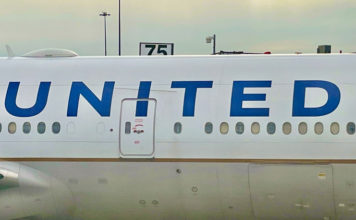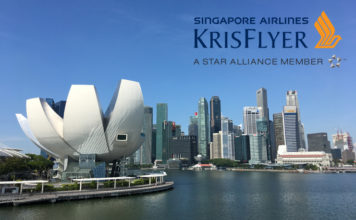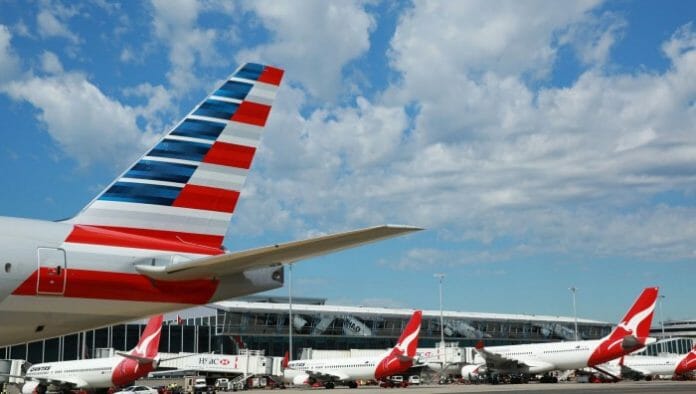
TravelingForMiles.com may receive commission from card issuers. Some or all of the card offers that appear on TravelingForMiles.com are from advertisers and may impact how and where card products appear on the site. TravelingForMiles.com does not include all card companies or all available card offers.
Some links to products and travel providers on this website will earn Traveling For Miles a commission which helps contribute to the running of the site – I’m very grateful to anyone who uses these links but their use is entirely optional. The compensation does not impact how and where products appear on this site and does not impact reviews that are published.
Two years after withdrawing their last request American Airlines and Qantas have gone back to the US Department of Transport (DOT) asking for permission to form a joint venture and to revenue share across the Pacific. Essentially the airlines are asking permission to create a similar agreement to the one American Airlines has with British Airways, Iberia & Finnair for flights across the Atlantic.
Before I continue with the airlines’ latest request a little history would probably help.
Back in 2015 American Airlines and Qantas asked the US DOT for antitrust immunity and permission to form a joint venture. The airlines argued that a JV would increase the number of routes both airlines could offer and would be great news for flyers. The airlines also suggested that, if their request wasn’t honored, routes would be cut and flyers would lose out.
The US DOT thought about this for a while, requested more details from the airlines, made noises indicating it didn’t really believe some of the claims the airlines were making and, in late 2016 and before the government had a chance to say ‘no’ to the JV, Qantas and American withdrew their request.

In early 2017 (supposedly as a reaction to the failed JV attempt) American & Qantas reduced the number of miles and status credits their frequent flyers earn on each other’s flights and the two airlines ceased their codeshare agreement on American’s service between LA and Sydney. American also scaled back its service to Auckland.
As far as negative changes go that was pretty much it.
On the positive side, American Airlines continues to fly to Sydney (a route it claimed was under threat if the JV didn’t go ahead) and Qantas used its shiny new 787-9 Dreamliners to launch new services to San Francisco.
Now, after a year of hard lobbying in Washington, the two airlines are back at the DOT’s door asking for permission to form a JV.
The airlines say that their request should be granted because the JV would:
- “significantly improve service”
- “stimulate demand”
- “unlock more than $300 million annually in consumer benefits that are not achievable through any other form of cooperation”
That $300m is apparently made up of “Up to $221 million in value from expanding codesharing between American and Qantas” and “[u]p to $89 million in value by offering a wider range of fare classes across each other’s networks, including lower fares and discounts“.

The airlines go on to say that granting permission for the JV will….
[G]ive American and Qantas the opportunity to launch additional routes between the U.S. and Australia and New Zealand, including new flights to city pairs currently not served by either carrier.
An expanded relationship will encourage significant improvements in the overall customer experience, including additional frequent flyer benefits and investments in lounges, baggage systems and other infrastructure designed to better serve the carriers’ joint customers.
Then comes a threat….
Critically, if the joint business is not approved, American and Qantas will have no choice but to further reduce codesharing on their networks. This will jeopardize the number of services and routes each carrier flies between the U.S. and Australia and New Zealand.
For example, Qantas may be forced to reduce the frequency of, downgauge or potentially cancel its A380 service between Sydney and Dallas/Fort Worth, and American may further reduce its services between Los Angeles and Sydney and Auckland. These routes rely on codeshare support from each airline’s feeder network via their respective hub cities to be economically viable.
Put simply, the airlines are saying that a JV will allow the them to offer customers things they can’t offer them now and the lack of a JV will see codeshares reduced and routes cut.

There Are A Few Problems With All Of That
The airlines want a joint venture because it would allow them to profit share (like BA and American do across the Atlantic) and legally collude on pricing (antitrust immunity). It has absolutely nothing to do with the airlines’ ability to codeshare.
American Airlines and Qantas are both part of the oneworld alliance and, as far as I can tell, can codeshare to their hearts’ content. Other airlines manage to codeshare without JV’s in place so it’s hard to understand why American and Qantas think they would find it so difficult.
The airlines’ argument appears to be “without a JV we cannot codeshare and without codeshares we cannot run our routes economically“…except that nothing is stopping them from codesharing in the first place. They don’t need a JV for that.
Before American and Etihad fell out, the Middle Eastern carrier flew its A380 to Dallas Ft. Worth purely because of a codeshare agreement which gave Etihad access to American’s domestic network. There was no JV in place and yet there was no issue setting up codeshares.
Leaving the codesharing argument to one side there are other issues with some of the claims the two airlines are making.
- The airlines claim the JV is necessary for new routes to be opened up….but Qantas is already on record as saying that it will be using its new 787-9 Dreamliners to open up more routes to the US. There’s never been a caveat added to those claims which says that they’re entirely reliant on a JV being approved.
- The airlines claim that the proposed $300m in consumer benefits can only be “unlocked” by a JV…but all the benefits they cite are covered by their existing agreement under the oneworld alliance. There isn’t anything stopping them from offering these benefits right now.
- It is suggested that the lack of a JV would risk Qantas’ route to Dallas…and yet the airline seems to be doing just fine on that route without a JV in place (primarily because it already has codeshare access to American’s huge domestic network out of DFW).
- American is saying that it may have to reduce its service to Sydney…but that’s what it said last time and nothing ever came of that threat.
- The airlines claim a JV would see an increase in frequent flyer benefits….but there’s nothing stopping the airlines offering these benefits right now – that’s the point of the alliance they’re both in.
- The airlines claim the JV is important to investments in lounges….and yet American is already part way through revamping most of its major US lounges, Qantas has already announced a new lounge in Perth, announced renovations to its Business Class lounge in Sydney and confirmed that its lounges in New Zealand are up next. The lack of a JV isn’t holding up the investment at all.
 Qantas already offers one of the best lounges in the US at LAX
Qantas already offers one of the best lounges in the US at LAX
There’s nothing new here so the airlines are clearly hoping that a year of Washington lobbying and new administration may now persuade the DOT that a JV is ok when, two years ago, it clearly was not.
What’s This All About?
The desire for American Airlines and Qantas to form a JV has absolutely nothing to do with providing consumers with more benefits, more savings or more choice and it has everything to do with eliminating competition and increasing profits for both airlines.
A JV would essentially see Qantas and American Airlines operating as a single carrier across the Pacific…and that’s not good news from a competitive standpoint. A JV would allow the airlines to collude on pricing and on schedules which would put upward pressure on fares and reduce consumer choice.
This is all about profit, profit and more profit.
Bottom Line
The lack of a JV isn’t a barrier to increased flyer benefits or to codesharing between American and Qantas so this is all a huge smokescreen.
American and Qantas are coming up with numbers they will struggle to prove and, most importantly, they will struggle to prove why the benefits and savings they claim a JV will bring can only be delivered if a JV is approved.
When looked at with a critical eye there is absolutely no reason this JV should be considered a good thing for consumers and there’s no way it should be allowed…..but that assumes the current DOT is capable of looking at this request with a critical eye in the first place.



![New York gets a new route to the heart of Tokyo with American Airlines [Updated for schedule information] Kabukichō, Tokyo street with many colorful signs](https://travelingformiles.com/wp-content/uploads/2024/01/tokyo-741-1-218x150.jpg)
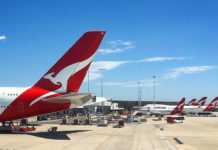
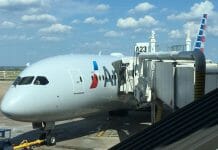
![American Airlines will offer a new service to Brisbane later this year [Updated for schedule update] a plane with rows of seats and monitors](https://travelingformiles.com/wp-content/uploads/2022/09/american-airlines-boeing-787-9-dreamliner-new-flagship-business-class-suite-1-741-218x150.jpg)

![The ideal 4 card American Express Membership Rewards team [Updated] a glass door with a picture of a man](https://travelingformiles.com/wp-content/uploads/2021/06/Amex-Centurion-Lounge-SFO-featured-741-356x220.jpg)

